Edie Melson's Blog, page 351
February 20, 2016
by Edie Melson @EdieMelsonShare your thoughts in the...
by Edie Melson @EdieMelson

Share your thoughts in the comment section below.
I also invite you to use this image any way you like online. Post it to your blog, share it on Facebook, Twitter, Pinterest, anywhere you'd like. All I ask is that you keep it intact, with my website watermark visible.
Don't forget to join the conversation!Blessings,Edie
TWEETABLE
"Imagination is like a muscle. I found out that the more I wrote, the bigger it got." Philip Jose Farmer (Click to Tweet)

Share your thoughts in the comment section below.
I also invite you to use this image any way you like online. Post it to your blog, share it on Facebook, Twitter, Pinterest, anywhere you'd like. All I ask is that you keep it intact, with my website watermark visible.
Don't forget to join the conversation!Blessings,Edie
TWEETABLE
"Imagination is like a muscle. I found out that the more I wrote, the bigger it got." Philip Jose Farmer (Click to Tweet)
Published on February 20, 2016 01:00
February 19, 2016
Rest in Peace, Big Ang
by Traci Tyne Hilton @TraciTyneHilton
 Angela Raiola, lovingly called “Big Ang,” passed away of stage four brain and lung cancer last night, and I was heartbroken.
Angela Raiola, lovingly called “Big Ang,” passed away of stage four brain and lung cancer last night, and I was heartbroken.
I didn’t know her personally. I’ve never even been to Staten Island. I knew her the same way the rest of American did…from Mob Wives.
She was a soft spoken woman with the craggy voice of someone who happened to have a tumor the size of a lemon on her vocal cords. Old pictures running around the internet show she used to be a tall, thin woman with a pretty, delicately featured face. The TV showed her as a tall woman with a well developed bust and huge lips. They called her Big Ang, not because of her lips, her height, or her bosom. She earned the name because of her big heart.Big Ang was a business woman, a grandmother, the wife of a much younger man, and in the past, a coke dealer.
Like all the Mob Wives, she was frank in her speech, loyal in her friendships, and immodest in her dress.
So, why did I care so much when I heard that she had passed?
 Because she was the anti-hero you could love.
Because she was the anti-hero you could love.
Big Ang was a flawed character. She had a past that you didn’t approve of, but was so kind, so reasonable, and so gentle with people around her that you couldn’t help but want the best for her. When Mob Wives (I have not seen any of her spin off shows, but I suspect they too showed this side of her) introduced characters for the sake of drama, Ang was the voice of reason, encouraging the other girls to accept people in spite of their flaws, to enjoy people for who they were without expecting them to change. “She’s a fun girl. She knows how to have a good time. I like her,” was often the first thing Ang said about someone.
On a show where women rated each other by the significance of their husband/father’s crimes, she rated women by if they were easy with a smile, and could laugh at a joke. In a world where being fast with your mouth and tough with your fists was most important, she was kind with her words, and open with her friendship.
She was a loving mother, devoted to her son’s successful break from a life of crime. She was a doting grandmother who couldn’t wait to meet her new namesake granddaughter. And she used to sell cocaine. Which is a horrible thing to do.
And yet, I loved her, the way you fall in love with characters.
And I want readers to fall in love with my characters. So I will be processing Big Ang, and what it means to be a lovable, but human character for a long time.
I’m grateful that she shared her life with us on TV because I think I will be a better person for having gotten a glimpse of it, and I know I will be a better writer if I consider what made her so lovable as I create my own bigger than life characters.
What anti-heroes have you found, in books and in life? Be sure to share your thoughts in the comments section below.
TWEETABLELoving the anti-heroes in our books and in our lives - @TraciTyneHilton (Click to Tweet)
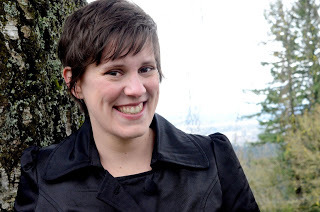 Traci Tyne Hilton is the author of The Plain Jane Mysteries, The Mitzy Neuhaus Mysteries and the Tillgiven Romantic Mysteries. Traci has a degree in history from Portland State University and still lives in the rainiest part of the Pacific Northwest with her husband the mandolin playing funeral director, two busy kids, and their dogs, Dr. Watson and Archie Goodwin.
Traci Tyne Hilton is the author of The Plain Jane Mysteries, The Mitzy Neuhaus Mysteries and the Tillgiven Romantic Mysteries. Traci has a degree in history from Portland State University and still lives in the rainiest part of the Pacific Northwest with her husband the mandolin playing funeral director, two busy kids, and their dogs, Dr. Watson and Archie Goodwin.
More of Traci’s work can be found at www.tracihilton.com
 Angela Raiola, lovingly called “Big Ang,” passed away of stage four brain and lung cancer last night, and I was heartbroken.
Angela Raiola, lovingly called “Big Ang,” passed away of stage four brain and lung cancer last night, and I was heartbroken.I didn’t know her personally. I’ve never even been to Staten Island. I knew her the same way the rest of American did…from Mob Wives.
She was a soft spoken woman with the craggy voice of someone who happened to have a tumor the size of a lemon on her vocal cords. Old pictures running around the internet show she used to be a tall, thin woman with a pretty, delicately featured face. The TV showed her as a tall woman with a well developed bust and huge lips. They called her Big Ang, not because of her lips, her height, or her bosom. She earned the name because of her big heart.Big Ang was a business woman, a grandmother, the wife of a much younger man, and in the past, a coke dealer.
Like all the Mob Wives, she was frank in her speech, loyal in her friendships, and immodest in her dress.
So, why did I care so much when I heard that she had passed?
 Because she was the anti-hero you could love.
Because she was the anti-hero you could love.Big Ang was a flawed character. She had a past that you didn’t approve of, but was so kind, so reasonable, and so gentle with people around her that you couldn’t help but want the best for her. When Mob Wives (I have not seen any of her spin off shows, but I suspect they too showed this side of her) introduced characters for the sake of drama, Ang was the voice of reason, encouraging the other girls to accept people in spite of their flaws, to enjoy people for who they were without expecting them to change. “She’s a fun girl. She knows how to have a good time. I like her,” was often the first thing Ang said about someone.
On a show where women rated each other by the significance of their husband/father’s crimes, she rated women by if they were easy with a smile, and could laugh at a joke. In a world where being fast with your mouth and tough with your fists was most important, she was kind with her words, and open with her friendship.
She was a loving mother, devoted to her son’s successful break from a life of crime. She was a doting grandmother who couldn’t wait to meet her new namesake granddaughter. And she used to sell cocaine. Which is a horrible thing to do.
And yet, I loved her, the way you fall in love with characters.
And I want readers to fall in love with my characters. So I will be processing Big Ang, and what it means to be a lovable, but human character for a long time.
I’m grateful that she shared her life with us on TV because I think I will be a better person for having gotten a glimpse of it, and I know I will be a better writer if I consider what made her so lovable as I create my own bigger than life characters.
What anti-heroes have you found, in books and in life? Be sure to share your thoughts in the comments section below.
TWEETABLELoving the anti-heroes in our books and in our lives - @TraciTyneHilton (Click to Tweet)
 Traci Tyne Hilton is the author of The Plain Jane Mysteries, The Mitzy Neuhaus Mysteries and the Tillgiven Romantic Mysteries. Traci has a degree in history from Portland State University and still lives in the rainiest part of the Pacific Northwest with her husband the mandolin playing funeral director, two busy kids, and their dogs, Dr. Watson and Archie Goodwin.
Traci Tyne Hilton is the author of The Plain Jane Mysteries, The Mitzy Neuhaus Mysteries and the Tillgiven Romantic Mysteries. Traci has a degree in history from Portland State University and still lives in the rainiest part of the Pacific Northwest with her husband the mandolin playing funeral director, two busy kids, and their dogs, Dr. Watson and Archie Goodwin.More of Traci’s work can be found at www.tracihilton.com
Published on February 19, 2016 01:00
February 18, 2016
5 More Things I Learned in My First Days as a Literary Agent… (Part 2)
by Cyle Young @CyleYoung
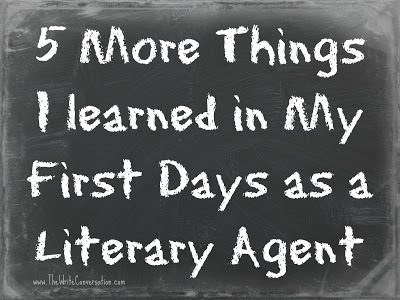 Every day as a new literary agent, I have wonderful, exhilarating, and often very humorous interactions with people, editors, manuscripts, and prospective clients.
Every day as a new literary agent, I have wonderful, exhilarating, and often very humorous interactions with people, editors, manuscripts, and prospective clients.
These first few months at Hartline Literary Agency have provided me with an ever-growing wealth of insight that I hope will help aspiring authors on their journey to find publishing success.I am fortunate to represent clients across three continents and to engage daily in equipping them to become successful authors. Much of my time is spent teaching and training my clients to help them avoid many of the trappings of novice writers. With the right tools, polished and edited manuscripts and proposals, and a lot of had work, these authors continue of their journeys a few steps ahead of their competition.
As always, I continue to be passionate about assisting writers who desire to become authors, and I hope these five takeaways will help you acquire an agent or get your manuscript accepted by a publisher.
1. Don’t tell an agent your husband/wife/friend edited it for you. Unless you are married to Stephen King or your best friend is J.K. Rowling it’s a good chance this describes a novice writer. I receive cover letters that mention this at least once every two weeks. If they are lucky, I will read the first page, but I can usually tell by the end of the first paragraph that indeed they are not married to Stephen King.
 Don't send lots of emails to a prospective agent.2. Don’t send lots of emails to a prospective agent. This business is slow; I can easily receive 100+ emails/day. If you annoy or pester me as a perspective client, I know you will do the same of worse as a client. That’s not something I want from my clients, and I may reject you simply because I don’t want that kind of relationship with my clients.
Don't send lots of emails to a prospective agent.2. Don’t send lots of emails to a prospective agent. This business is slow; I can easily receive 100+ emails/day. If you annoy or pester me as a perspective client, I know you will do the same of worse as a client. That’s not something I want from my clients, and I may reject you simply because I don’t want that kind of relationship with my clients.
3. Don’t address an email to every agent in an agency as a group. Agents don’t have time to read manuscripts that are not specifically submitted to them. You may write a genre that I don’t even represent. When I am trying to find time in my day to read submissions, I always read the submissions that are specifically addressed to me first. Many times I don’t even look at “shotgun” submissions, because there’s just not enough time in the day some weeks.
 Don't submit to an agent unless the book is completed.4. Don’t submit to an agent unless the book is completed. Unless you are a successful published author. I can’t help you. If the book isn’t completed, I will typically ask you to resubmit when it is completed. I will not read your sample chapters or proposal until then. I want to sell your book, when it is ready. In the meantime, I am going to work hard to sell books for my other clients that are finished.
Don't submit to an agent unless the book is completed.4. Don’t submit to an agent unless the book is completed. Unless you are a successful published author. I can’t help you. If the book isn’t completed, I will typically ask you to resubmit when it is completed. I will not read your sample chapters or proposal until then. I want to sell your book, when it is ready. In the meantime, I am going to work hard to sell books for my other clients that are finished.
5. Don’t tell an agent how great your book is. Your book should be able speak for itself. I read hundreds of manuscripts. I’m going to have a pretty good idea about the quality of your book in the first few pages. Typically, when writers tell me how great their book is in their cover letter, I find that it is less than impressive. But, on the flipside, do tell me if the book has won awards. If other organizations have said your manuscripts is good, that carries some weight.
Before you submit, take some time and think like an agent. If you were an agent, how would you respond to what is said in your cover letter?
Those answers matter.
The goal is to get the agent to read your sample chapters and fall in love with your writing. Do your finest to avoid some of these missteps and ensure that your manuscript has the best possible opportunity to find representation.
TWEETABLES5 more things I l learned in my first days as a literary agent - @CyleYoung (Click to Tweet)
Don't make these mistakes when submitting to a literary agent - @CyleYoung (Click to Tweet)
 Cyle Young is thankful God blessed him with the uniqueness of being an ADD-riddled…SQUIRREL!...binge writer. Not much unlike the classic video game Frogger, Cyle darts back and forth between various writing genres. He crafts princess children’s stories, how-to advice for parents, epic fantasy tales, and easy readers.
Cyle Young is thankful God blessed him with the uniqueness of being an ADD-riddled…SQUIRREL!...binge writer. Not much unlike the classic video game Frogger, Cyle darts back and forth between various writing genres. He crafts princess children’s stories, how-to advice for parents, epic fantasy tales, and easy readers.
 Every day as a new literary agent, I have wonderful, exhilarating, and often very humorous interactions with people, editors, manuscripts, and prospective clients.
Every day as a new literary agent, I have wonderful, exhilarating, and often very humorous interactions with people, editors, manuscripts, and prospective clients. These first few months at Hartline Literary Agency have provided me with an ever-growing wealth of insight that I hope will help aspiring authors on their journey to find publishing success.I am fortunate to represent clients across three continents and to engage daily in equipping them to become successful authors. Much of my time is spent teaching and training my clients to help them avoid many of the trappings of novice writers. With the right tools, polished and edited manuscripts and proposals, and a lot of had work, these authors continue of their journeys a few steps ahead of their competition.
As always, I continue to be passionate about assisting writers who desire to become authors, and I hope these five takeaways will help you acquire an agent or get your manuscript accepted by a publisher.
1. Don’t tell an agent your husband/wife/friend edited it for you. Unless you are married to Stephen King or your best friend is J.K. Rowling it’s a good chance this describes a novice writer. I receive cover letters that mention this at least once every two weeks. If they are lucky, I will read the first page, but I can usually tell by the end of the first paragraph that indeed they are not married to Stephen King.
 Don't send lots of emails to a prospective agent.2. Don’t send lots of emails to a prospective agent. This business is slow; I can easily receive 100+ emails/day. If you annoy or pester me as a perspective client, I know you will do the same of worse as a client. That’s not something I want from my clients, and I may reject you simply because I don’t want that kind of relationship with my clients.
Don't send lots of emails to a prospective agent.2. Don’t send lots of emails to a prospective agent. This business is slow; I can easily receive 100+ emails/day. If you annoy or pester me as a perspective client, I know you will do the same of worse as a client. That’s not something I want from my clients, and I may reject you simply because I don’t want that kind of relationship with my clients.3. Don’t address an email to every agent in an agency as a group. Agents don’t have time to read manuscripts that are not specifically submitted to them. You may write a genre that I don’t even represent. When I am trying to find time in my day to read submissions, I always read the submissions that are specifically addressed to me first. Many times I don’t even look at “shotgun” submissions, because there’s just not enough time in the day some weeks.
 Don't submit to an agent unless the book is completed.4. Don’t submit to an agent unless the book is completed. Unless you are a successful published author. I can’t help you. If the book isn’t completed, I will typically ask you to resubmit when it is completed. I will not read your sample chapters or proposal until then. I want to sell your book, when it is ready. In the meantime, I am going to work hard to sell books for my other clients that are finished.
Don't submit to an agent unless the book is completed.4. Don’t submit to an agent unless the book is completed. Unless you are a successful published author. I can’t help you. If the book isn’t completed, I will typically ask you to resubmit when it is completed. I will not read your sample chapters or proposal until then. I want to sell your book, when it is ready. In the meantime, I am going to work hard to sell books for my other clients that are finished.5. Don’t tell an agent how great your book is. Your book should be able speak for itself. I read hundreds of manuscripts. I’m going to have a pretty good idea about the quality of your book in the first few pages. Typically, when writers tell me how great their book is in their cover letter, I find that it is less than impressive. But, on the flipside, do tell me if the book has won awards. If other organizations have said your manuscripts is good, that carries some weight.
Before you submit, take some time and think like an agent. If you were an agent, how would you respond to what is said in your cover letter?
Those answers matter.
The goal is to get the agent to read your sample chapters and fall in love with your writing. Do your finest to avoid some of these missteps and ensure that your manuscript has the best possible opportunity to find representation.
TWEETABLES5 more things I l learned in my first days as a literary agent - @CyleYoung (Click to Tweet)
Don't make these mistakes when submitting to a literary agent - @CyleYoung (Click to Tweet)
 Cyle Young is thankful God blessed him with the uniqueness of being an ADD-riddled…SQUIRREL!...binge writer. Not much unlike the classic video game Frogger, Cyle darts back and forth between various writing genres. He crafts princess children’s stories, how-to advice for parents, epic fantasy tales, and easy readers.
Cyle Young is thankful God blessed him with the uniqueness of being an ADD-riddled…SQUIRREL!...binge writer. Not much unlike the classic video game Frogger, Cyle darts back and forth between various writing genres. He crafts princess children’s stories, how-to advice for parents, epic fantasy tales, and easy readers.
Published on February 18, 2016 01:00
February 17, 2016
7 Golden Keys to Writing Bible Studies
by Katy Kauffman @KatyKauffman28
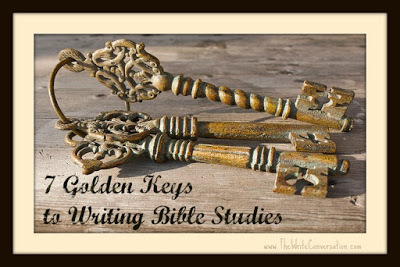 Warmth, insight, flare. I look for these qualities when I want to buy a Bible study for my quiet time. I want something that draws my heart close to God, lets me see a little of the author’s heart and mind, exposes the truths of God’s Word, and presents application with personality, vibrancy, and sparkle. How about you?
Warmth, insight, flare. I look for these qualities when I want to buy a Bible study for my quiet time. I want something that draws my heart close to God, lets me see a little of the author’s heart and mind, exposes the truths of God’s Word, and presents application with personality, vibrancy, and sparkle. How about you?
It’s only fair that we include in the Bible studies that we write the types of things we love to find in others’ studies. So how can we do that? Here are seven golden keys to writing Bible studies that stir both the heart and the mind.
1. Seek God’s guidance. Spend some time with the Author of the Book. If God has called you to write for Him, He knows exactly what messages and topics He wants you to share with the world. When we have God’s calling to write, His direction to follow, and His grace to depend on as we write, we will have the wisdom, confidence, and endurance we need to see the project through to the end.
 Develop your writing skill and voice.2. Develop your writing skill and voice.If you’re new to writing, take some time to develop the craft (and never stop growing). Read great books on writing, attend conferences, and take classes. Bible study writers especially need to be excellent in their writing skill because what we’re writing about is so precious and life-changing. Write some devotions, and enter them in a contest. Start a blog. Start small, and dream big.
Develop your writing skill and voice.2. Develop your writing skill and voice.If you’re new to writing, take some time to develop the craft (and never stop growing). Read great books on writing, attend conferences, and take classes. Bible study writers especially need to be excellent in their writing skill because what we’re writing about is so precious and life-changing. Write some devotions, and enter them in a contest. Start a blog. Start small, and dream big.
As you write, develop your voice . Writing isn’t just technical rules—it’s conversation. Write as if you’re having a conversation with a friend. What kind of voice, or tone, would you have with them? Make a friend out of your reader by sounding encouraging and uplifting.
3. Remember who you’re writing to and why.Identify your target audience, and write your Bible study with them in mind. Are they younger or older? What struggles are associated with their season of life? Are they familiar with Scripture or new to the Christian life? What is your purpose in writing to them—to encourage, instruct, give hope, explain Scripture, etc.? As you put black words on a white page, remember that your audience is colorful, alive, and human.
4. Know your topic from the inside out. When we write about something we have lived through, we are witnesses to the pain, struggle, victory, and joy related to that topic. We have ached with loss, struggled with sanity while raising our kids, winced at Satan’s painful arrows, or stumbled in trusting God. We saw Him heal our hearts, give us grace and endurance, become our protection, or strengthen our faith. When God pinpoints what to write about, talk about it from the inside out, not as a spectator looking in. Check out my previous post called Writing from the Inside Out for more insight on how to write like you know what you’re talking about.
 Take the time to understand your Scripture.5. Take the time to understand your Scripture. Although we can present Scripture from a particular angle or slant, the heart of any Bible study should be understanding and applying God’s Word to daily life. Take whatever time is needed to study Scripture with its Author. Use helpful resources such as Bible dictionaries and commentaries as needed. We may not learn the definition of every word or know how to answer every question that a reader might have. But we can study enough till we have an accurate understanding of the book or passages we are writing about, and come away with a peace that we have studied enough. The power to change lives is found in the Word, and by God’s grace, we are stewards of that Word.
Take the time to understand your Scripture.5. Take the time to understand your Scripture. Although we can present Scripture from a particular angle or slant, the heart of any Bible study should be understanding and applying God’s Word to daily life. Take whatever time is needed to study Scripture with its Author. Use helpful resources such as Bible dictionaries and commentaries as needed. We may not learn the definition of every word or know how to answer every question that a reader might have. But we can study enough till we have an accurate understanding of the book or passages we are writing about, and come away with a peace that we have studied enough. The power to change lives is found in the Word, and by God’s grace, we are stewards of that Word.
6. Pair truth with stories and illustrations.God loves stories. From Genesis to Revelation, the Bible is filled with story after story illustrating the goodness and love of God, the need of mankind for redemption, the saving work of Christ, and the oneness and courage God wants believers to have. We learn by stories. Choose memorable stories and illustrations that will help readers to remember your application and live it out. If you need some ideas for this, check out my previous post, For Non-fiction Authors: Tips for Choosing the Right Story .
7. Make your Bible study as interactive as possible.Ask questions. Supply cross-references for your readers to look up. Give prayer guides. Start a Facebook page for your book, and invite readers to discuss topics on it. Incorporate as many small group activities as you can into your book, either for an individual to contemplate or do, or for a small group to use. The more involved the readers feel, the more they will remember.
Which of the 7 keys above would be the most important to you in buying a Bible study for yourself? Which one do you need to focus on the most as you write? Don’t forget to join the conversation!
TWEETABLE
7 Golden Keys to #Writing Bible Studies - @KatyKauffman28 on @EdieMelson (Click to Tweet)
Don't forget the basics when #writing Bible studies - tips from @KatyKauffman28 (Click to Tweet)
 Katy Kauffman is an award-winning writer and a co-founder of Lighthouse Bible Studies, a ministry which seeks to connect people to God through His Word.
Katy Kauffman is an award-winning writer and a co-founder of Lighthouse Bible Studies, a ministry which seeks to connect people to God through His Word.
She has taught the Bible to women and teens, and has two published Bible studies for women, 2 Timothy: Winning the Victory and Faith, Courage, and Victory. She is an editor of the new Refresh Bible Study Magazine and the designer of Broken but Priceless: The Magazine. She makes her home near Atlanta, Georgia.
 Warmth, insight, flare. I look for these qualities when I want to buy a Bible study for my quiet time. I want something that draws my heart close to God, lets me see a little of the author’s heart and mind, exposes the truths of God’s Word, and presents application with personality, vibrancy, and sparkle. How about you?
Warmth, insight, flare. I look for these qualities when I want to buy a Bible study for my quiet time. I want something that draws my heart close to God, lets me see a little of the author’s heart and mind, exposes the truths of God’s Word, and presents application with personality, vibrancy, and sparkle. How about you?It’s only fair that we include in the Bible studies that we write the types of things we love to find in others’ studies. So how can we do that? Here are seven golden keys to writing Bible studies that stir both the heart and the mind.
1. Seek God’s guidance. Spend some time with the Author of the Book. If God has called you to write for Him, He knows exactly what messages and topics He wants you to share with the world. When we have God’s calling to write, His direction to follow, and His grace to depend on as we write, we will have the wisdom, confidence, and endurance we need to see the project through to the end.
 Develop your writing skill and voice.2. Develop your writing skill and voice.If you’re new to writing, take some time to develop the craft (and never stop growing). Read great books on writing, attend conferences, and take classes. Bible study writers especially need to be excellent in their writing skill because what we’re writing about is so precious and life-changing. Write some devotions, and enter them in a contest. Start a blog. Start small, and dream big.
Develop your writing skill and voice.2. Develop your writing skill and voice.If you’re new to writing, take some time to develop the craft (and never stop growing). Read great books on writing, attend conferences, and take classes. Bible study writers especially need to be excellent in their writing skill because what we’re writing about is so precious and life-changing. Write some devotions, and enter them in a contest. Start a blog. Start small, and dream big. As you write, develop your voice . Writing isn’t just technical rules—it’s conversation. Write as if you’re having a conversation with a friend. What kind of voice, or tone, would you have with them? Make a friend out of your reader by sounding encouraging and uplifting.
3. Remember who you’re writing to and why.Identify your target audience, and write your Bible study with them in mind. Are they younger or older? What struggles are associated with their season of life? Are they familiar with Scripture or new to the Christian life? What is your purpose in writing to them—to encourage, instruct, give hope, explain Scripture, etc.? As you put black words on a white page, remember that your audience is colorful, alive, and human.
4. Know your topic from the inside out. When we write about something we have lived through, we are witnesses to the pain, struggle, victory, and joy related to that topic. We have ached with loss, struggled with sanity while raising our kids, winced at Satan’s painful arrows, or stumbled in trusting God. We saw Him heal our hearts, give us grace and endurance, become our protection, or strengthen our faith. When God pinpoints what to write about, talk about it from the inside out, not as a spectator looking in. Check out my previous post called Writing from the Inside Out for more insight on how to write like you know what you’re talking about.
 Take the time to understand your Scripture.5. Take the time to understand your Scripture. Although we can present Scripture from a particular angle or slant, the heart of any Bible study should be understanding and applying God’s Word to daily life. Take whatever time is needed to study Scripture with its Author. Use helpful resources such as Bible dictionaries and commentaries as needed. We may not learn the definition of every word or know how to answer every question that a reader might have. But we can study enough till we have an accurate understanding of the book or passages we are writing about, and come away with a peace that we have studied enough. The power to change lives is found in the Word, and by God’s grace, we are stewards of that Word.
Take the time to understand your Scripture.5. Take the time to understand your Scripture. Although we can present Scripture from a particular angle or slant, the heart of any Bible study should be understanding and applying God’s Word to daily life. Take whatever time is needed to study Scripture with its Author. Use helpful resources such as Bible dictionaries and commentaries as needed. We may not learn the definition of every word or know how to answer every question that a reader might have. But we can study enough till we have an accurate understanding of the book or passages we are writing about, and come away with a peace that we have studied enough. The power to change lives is found in the Word, and by God’s grace, we are stewards of that Word. 6. Pair truth with stories and illustrations.God loves stories. From Genesis to Revelation, the Bible is filled with story after story illustrating the goodness and love of God, the need of mankind for redemption, the saving work of Christ, and the oneness and courage God wants believers to have. We learn by stories. Choose memorable stories and illustrations that will help readers to remember your application and live it out. If you need some ideas for this, check out my previous post, For Non-fiction Authors: Tips for Choosing the Right Story .
7. Make your Bible study as interactive as possible.Ask questions. Supply cross-references for your readers to look up. Give prayer guides. Start a Facebook page for your book, and invite readers to discuss topics on it. Incorporate as many small group activities as you can into your book, either for an individual to contemplate or do, or for a small group to use. The more involved the readers feel, the more they will remember.
Which of the 7 keys above would be the most important to you in buying a Bible study for yourself? Which one do you need to focus on the most as you write? Don’t forget to join the conversation!
TWEETABLE
7 Golden Keys to #Writing Bible Studies - @KatyKauffman28 on @EdieMelson (Click to Tweet)
Don't forget the basics when #writing Bible studies - tips from @KatyKauffman28 (Click to Tweet)
 Katy Kauffman is an award-winning writer and a co-founder of Lighthouse Bible Studies, a ministry which seeks to connect people to God through His Word.
Katy Kauffman is an award-winning writer and a co-founder of Lighthouse Bible Studies, a ministry which seeks to connect people to God through His Word. She has taught the Bible to women and teens, and has two published Bible studies for women, 2 Timothy: Winning the Victory and Faith, Courage, and Victory. She is an editor of the new Refresh Bible Study Magazine and the designer of Broken but Priceless: The Magazine. She makes her home near Atlanta, Georgia.
Published on February 17, 2016 01:00
February 16, 2016
When You Feel Forgotten
by Lucinda Secrest McDowell @LucindaSMcDowel
 She was waiting by the sink in the ladies room as I began washing my hands.
She was waiting by the sink in the ladies room as I began washing my hands.
“Excuse me,” she interrupted, “But the Lord has given me a prophetic word for you.”
I was in Colorado Springs for meetings with my literary agent and publishers. Honestly, the meetings weren’t going very well, and I had escaped our dinner table at the restaurant to have a moment alone. Maybe I never would write another book. Maybe I had nothing more to say…The stranger continued as I stood there, too startled to speak; “God told me to tell you this: You will not be forgotten.”
I gulped, “Okay. Thanks.”
And then she interjected, “And, oh yeah, something about your stomach. Is there a medical problem? Well, God says that’s going to be okay too.” (Now I was really spooked; and it was years later until I finally understood that part of her word from God.)
But as she left the tiny room, she turned back with a smile, “Remember, you will not be forgotten!”
I never saw her again.
I also never shared this story. Until now, fifteen years later.
It seemed too far-fetched. Too “out there.” Prophecies in bathrooms simply are not part of my normal life—even my spiritual journey.
 But I did write it all down in my journal. And I did pray, asking God to show me what, if anything, this was to mean in my life.
But I did write it all down in my journal. And I did pray, asking God to show me what, if anything, this was to mean in my life.
As a writer, do you sometimes feel that everyone else is getting the contracts and followers and invitations, and you’re just invisible?
Honestly, sometimes I do feel forgotten.
But the same God who called me to this work also said: “I will not forget you! See, I have engraved you on the palms of my hands.”~ Isaiah 49:15-16
In Scripture, when that promise is made, there are two rather interesting reinforcements: one before and one after. Leading into those words is an illustration that hits close to home: “Can a woman forget her nursing child, / fail to pity the child of her womb? / Even these may forget, / but I won’t forget you” (Isaiah 49:15 CEB). As a mother who raised four children, I cannot imagine a world in which I would forget my nursing baby.
And though I don’t have any tattoos, I have certainly written ink reminders on my hand. Sort of like the second reinforcement in that verse: “See, I have engraved you on the palms of my hands.” In biblical times a slave would often bear the brand of his master, but what a switch to have the Master inscribing his servant’s name on his hand—a tangible reminder of the covenant between God and His people.
In order for God to forget us, the scars in the palms of His hands must disappear.
And that’s never going to happen, as this old hymn affirms: “My name from the palms of His hands eternity will not erase; Impressed on His heart it remains, in marks of indelible grace. Yes, I to the end shall endure, as sure as the earnest is given; More happy, but not more secure, the glorified spirits in Heaven.” (Toplady, 1771)
Are you worried God might forget you?
I don’t even need the gift of prophecy to reply, “God says you will not be forgotten!”
TWEETABLES
When you feel forgotten, God reminds us we're not - @LucindaSMcDowel on @EdieMelson (Click to Tweet)
In order for God to forget us, the scars on His hands must disappear - @LucindaSMcDowel (Click to Tweet)
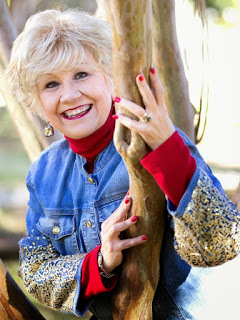 Lucinda Secrest McDowell, M.T.S., is the author of 11 books, contributing author to 25 books, and has published in more than 50 magazines. A graduate of Gordon-Conwell Theological Seminary and Furman University, she studied at the Wheaton Graduate School of Communication and served as Communications Specialist for the Lausanne Committee for World Evangelization (Thailand) and Editor for Billy Graham’s International Conference for Itinerant Evangelists (Netherlands). A member of Advanced Writers and Speakers Association (AWSA), she has received “Writer of the Year” awards from both Mt. Hermon and Blue Ridge Writers Conferences. Cindy speaks internationally through her ministry “Encouraging Words” and co-directs the New England Christian Writers Retreat. Known for her ability to convey deep truth in practical and winsome ways, she writes from “Sunnyside” cottage in New England. Visit her online at www.EncouragingWords.net
Lucinda Secrest McDowell, M.T.S., is the author of 11 books, contributing author to 25 books, and has published in more than 50 magazines. A graduate of Gordon-Conwell Theological Seminary and Furman University, she studied at the Wheaton Graduate School of Communication and served as Communications Specialist for the Lausanne Committee for World Evangelization (Thailand) and Editor for Billy Graham’s International Conference for Itinerant Evangelists (Netherlands). A member of Advanced Writers and Speakers Association (AWSA), she has received “Writer of the Year” awards from both Mt. Hermon and Blue Ridge Writers Conferences. Cindy speaks internationally through her ministry “Encouraging Words” and co-directs the New England Christian Writers Retreat. Known for her ability to convey deep truth in practical and winsome ways, she writes from “Sunnyside” cottage in New England. Visit her online at www.EncouragingWords.net
Links www.NewEnglandChristianWritersRetreat.com
Blog/website www.EncouragingWords.net
 She was waiting by the sink in the ladies room as I began washing my hands.
She was waiting by the sink in the ladies room as I began washing my hands.“Excuse me,” she interrupted, “But the Lord has given me a prophetic word for you.”
I was in Colorado Springs for meetings with my literary agent and publishers. Honestly, the meetings weren’t going very well, and I had escaped our dinner table at the restaurant to have a moment alone. Maybe I never would write another book. Maybe I had nothing more to say…The stranger continued as I stood there, too startled to speak; “God told me to tell you this: You will not be forgotten.”
I gulped, “Okay. Thanks.”
And then she interjected, “And, oh yeah, something about your stomach. Is there a medical problem? Well, God says that’s going to be okay too.” (Now I was really spooked; and it was years later until I finally understood that part of her word from God.)
But as she left the tiny room, she turned back with a smile, “Remember, you will not be forgotten!”
I never saw her again.
I also never shared this story. Until now, fifteen years later.
It seemed too far-fetched. Too “out there.” Prophecies in bathrooms simply are not part of my normal life—even my spiritual journey.
 But I did write it all down in my journal. And I did pray, asking God to show me what, if anything, this was to mean in my life.
But I did write it all down in my journal. And I did pray, asking God to show me what, if anything, this was to mean in my life.As a writer, do you sometimes feel that everyone else is getting the contracts and followers and invitations, and you’re just invisible?
Honestly, sometimes I do feel forgotten.
But the same God who called me to this work also said: “I will not forget you! See, I have engraved you on the palms of my hands.”~ Isaiah 49:15-16
In Scripture, when that promise is made, there are two rather interesting reinforcements: one before and one after. Leading into those words is an illustration that hits close to home: “Can a woman forget her nursing child, / fail to pity the child of her womb? / Even these may forget, / but I won’t forget you” (Isaiah 49:15 CEB). As a mother who raised four children, I cannot imagine a world in which I would forget my nursing baby.
And though I don’t have any tattoos, I have certainly written ink reminders on my hand. Sort of like the second reinforcement in that verse: “See, I have engraved you on the palms of my hands.” In biblical times a slave would often bear the brand of his master, but what a switch to have the Master inscribing his servant’s name on his hand—a tangible reminder of the covenant between God and His people.
In order for God to forget us, the scars in the palms of His hands must disappear.
And that’s never going to happen, as this old hymn affirms: “My name from the palms of His hands eternity will not erase; Impressed on His heart it remains, in marks of indelible grace. Yes, I to the end shall endure, as sure as the earnest is given; More happy, but not more secure, the glorified spirits in Heaven.” (Toplady, 1771)
Are you worried God might forget you?
I don’t even need the gift of prophecy to reply, “God says you will not be forgotten!”
TWEETABLES
When you feel forgotten, God reminds us we're not - @LucindaSMcDowel on @EdieMelson (Click to Tweet)
In order for God to forget us, the scars on His hands must disappear - @LucindaSMcDowel (Click to Tweet)
 Lucinda Secrest McDowell, M.T.S., is the author of 11 books, contributing author to 25 books, and has published in more than 50 magazines. A graduate of Gordon-Conwell Theological Seminary and Furman University, she studied at the Wheaton Graduate School of Communication and served as Communications Specialist for the Lausanne Committee for World Evangelization (Thailand) and Editor for Billy Graham’s International Conference for Itinerant Evangelists (Netherlands). A member of Advanced Writers and Speakers Association (AWSA), she has received “Writer of the Year” awards from both Mt. Hermon and Blue Ridge Writers Conferences. Cindy speaks internationally through her ministry “Encouraging Words” and co-directs the New England Christian Writers Retreat. Known for her ability to convey deep truth in practical and winsome ways, she writes from “Sunnyside” cottage in New England. Visit her online at www.EncouragingWords.net
Lucinda Secrest McDowell, M.T.S., is the author of 11 books, contributing author to 25 books, and has published in more than 50 magazines. A graduate of Gordon-Conwell Theological Seminary and Furman University, she studied at the Wheaton Graduate School of Communication and served as Communications Specialist for the Lausanne Committee for World Evangelization (Thailand) and Editor for Billy Graham’s International Conference for Itinerant Evangelists (Netherlands). A member of Advanced Writers and Speakers Association (AWSA), she has received “Writer of the Year” awards from both Mt. Hermon and Blue Ridge Writers Conferences. Cindy speaks internationally through her ministry “Encouraging Words” and co-directs the New England Christian Writers Retreat. Known for her ability to convey deep truth in practical and winsome ways, she writes from “Sunnyside” cottage in New England. Visit her online at www.EncouragingWords.net Links www.NewEnglandChristianWritersRetreat.com
Blog/website www.EncouragingWords.net
Published on February 16, 2016 01:00
February 15, 2016
One Important Social Media Connection Point You May Be Missing
by Edie Melson @EdieMelson
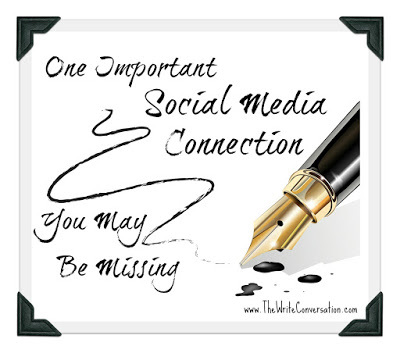 It’s important that in today’s digital age, writers don’t pass up marketing opportunities.
It’s important that in today’s digital age, writers don’t pass up marketing opportunities.
Unfortunately, I see a lot of writers doing just that when they send out emails.
Your email signature line is prime marketing real estate.
If you’re not certain what a signature line (sometimes called a sig line) is, it’s the line or lines including or directly below your signature. You can set up one that is automatically generated within your email program. Just go to settings, signature, and set it up.
Your name and/or the name you write under.A link to your website.Your blog address.Your twitter account name.Your Facebook Fan Page link.A link to your latest book (if you write books).When you include links in your sig line, make certain they are clickable. For instance, I don’t say follow me on Twitter, @EdieMelson, I actually link to my Twitter profile. That way the person reading my email doesn’t have to go to Twitter and do a search for @EdieMelson, they can just click and are taken to my Twitter homepage.
Warnings:Keep your signature line to a maximum of 15 lines. Anything more and people lose interest.Try NOT to add graphics, except for book covers, and limit those to ONE. Other, gimmicky graphics take longer to load and the person who receives the email often has to click on a permission tab to see them and most of us don’t bother. Here’s a screenshot of my email sig line to help you see what it looks like:

Special Note: don't forget to set up email signatures on all your devices—anything you send email from—like:
Cell phone.Tablet.Ereader.Now it’s your turn, what questions do you have about adding a signature line to your email?
Don’t forget to join the conversationBlessings,Edie
TWEETABLESA writer's email signature line is prime #SocialMedia marketing real estate - @EdieMelson (Click to Tweet)
One Important #SocialMedia Connection Point You May Be Missing - tips from @EdieMelson (Click to Tweet)
 It’s important that in today’s digital age, writers don’t pass up marketing opportunities.
It’s important that in today’s digital age, writers don’t pass up marketing opportunities. Unfortunately, I see a lot of writers doing just that when they send out emails.
Your email signature line is prime marketing real estate.
If you’re not certain what a signature line (sometimes called a sig line) is, it’s the line or lines including or directly below your signature. You can set up one that is automatically generated within your email program. Just go to settings, signature, and set it up.
Your name and/or the name you write under.A link to your website.Your blog address.Your twitter account name.Your Facebook Fan Page link.A link to your latest book (if you write books).When you include links in your sig line, make certain they are clickable. For instance, I don’t say follow me on Twitter, @EdieMelson, I actually link to my Twitter profile. That way the person reading my email doesn’t have to go to Twitter and do a search for @EdieMelson, they can just click and are taken to my Twitter homepage.
Warnings:Keep your signature line to a maximum of 15 lines. Anything more and people lose interest.Try NOT to add graphics, except for book covers, and limit those to ONE. Other, gimmicky graphics take longer to load and the person who receives the email often has to click on a permission tab to see them and most of us don’t bother. Here’s a screenshot of my email sig line to help you see what it looks like:

Special Note: don't forget to set up email signatures on all your devices—anything you send email from—like:
Cell phone.Tablet.Ereader.Now it’s your turn, what questions do you have about adding a signature line to your email?
Don’t forget to join the conversationBlessings,Edie
TWEETABLESA writer's email signature line is prime #SocialMedia marketing real estate - @EdieMelson (Click to Tweet)
One Important #SocialMedia Connection Point You May Be Missing - tips from @EdieMelson (Click to Tweet)
Published on February 15, 2016 01:00
February 14, 2016
A Love Story
 by Sarah Van Diest
by Sarah Van DiestI have dreams from time to time where I see myself in a mirror. I don’t ever look like I do in the awake world. This dream world version is more like what you would see in a zombie movie. I always find it difficult to recognize myself, but then I force myself to look into the mirror and accept the truth that I am the grotesque figure looking back at me. Those are my dreams. They are pretty awful. I had one last night. My face was severely lopsided, as if it was made of wax and half of it was melting off. Most of my hair was gone. I was about 100 pounds overweight and probably about 30 years older than I am now, but it was supposed to be me presently. I saw myself in the mirror, felt the horror, made myself swallow the truth, and tried to go on, but with the added weight of my shame. All I wanted to do was close my eyes and pretend it wasn’t true.
And then I woke up. Reality is not what I dreamt, but the shame stayed with me. The feeling that I am a disfigured monster stays with me still. I bring it with me as I enter into conversation with people at church or at the store, and I wonder how they can stand to look at me. I wonder how they can keep themselves from vomiting on site. I want to ease their pain, so I try to make our encounters brief. I don’t make them suffer long. I know if they look long enough, they will recognize they are talking to a monster and be frightened away or be sickened at the sight. I know they will see the monster, and the monster is me.
 That is shame. That is a core belief about a self full of death and decay. I don’t intend to have these dreams. They happen because they reflect what is happening in my soul. They show me what I’m fighting against. And it is a fight. Even in the dreams it is a fight. When I see myself there in the mirror I don’t want it to be true, I feel the resistance to the image I see, but my dreams don’t supply me with a different mirror; no alternate image is available. All I know is what I see and though there is a fight, it is short-lived and soon I resign.
That is shame. That is a core belief about a self full of death and decay. I don’t intend to have these dreams. They happen because they reflect what is happening in my soul. They show me what I’m fighting against. And it is a fight. Even in the dreams it is a fight. When I see myself there in the mirror I don’t want it to be true, I feel the resistance to the image I see, but my dreams don’t supply me with a different mirror; no alternate image is available. All I know is what I see and though there is a fight, it is short-lived and soon I resign. This is a sad story, I know, but I share it because I know I’m not alone. I know there are others who suffer the same way and some to even greater extremes. The Enemy knows the truth about our beauty, loveliness, worth and value, but doesn’t want us to know it. He sets up “mirrors” all over our world to distort the reality of who we are and in whose image we were made. Our souls wrestle with the warring ideas and we are tempted to follow the Enemy’s lead. It is easier to believe the lie than to accept the truth. I’m not sure why.
I look at dreams like these as red flag warnings and whispers from the Lord to fall into His arms and immerse myself in His truth and His Word, because “…our struggle is not against flesh and blood, but against the rulers, against the powers, against the world forces of this darkness, against the spiritual forces of wickedness in the heavenly places.” The mind is a powerful thing and much of our fight goes on there. God knew our propensity to focus on the negative aspects of ourselves and life in general, so He told us to dwell on the things that are good and noble and worthy of praise (see Phil. 4:8), and not on the things of this world (see Rom. 12:2). He told us to look up to the hills to see our help coming (see Ps. 121).
 Here, let’s dive in, immerse in His Word and look up to the hills for help. Psalm 139 says: For You formed my inward parts;
Here, let’s dive in, immerse in His Word and look up to the hills for help. Psalm 139 says: For You formed my inward parts;You wove me in my mother’s womb.
14 I will give thanks to You, for I am fearfully and wonderfully made;
Wonderful are Your works,
And my soul knows it very well.
15 My frame was not hidden from You,
When I was made in secret,
And skillfully wrought in the depths of the earth;
16 Your eyes have seen my unformed substance;
And in Your book were all written
The days that were ordained for me,
When as yet there was not one of them.17 How precious also are Your thoughts to me, O God!
How vast is the sum of them!
18 If I should count them, they would outnumber the sand.
When I awake, I am still with You.
And what of Luke 12: 6-7:“Are not five sparrows sold for two pennies? And not one of them is forgotten before God. Why, even the hairs of your head are all numbered. Fear not; you are of more value than many sparrows.”
And Genesis 1:27:“So God created man in his own image, in the image of God he created him; male and female he created them.”
There are many more verses that tell us we are of great and immeasurable value to God (Eph. 2:10, I John 3:16, John 3:16, Ps. 8, Eph. 1:3-5, Matt. 10:31). Jesus’ death on the cross was a statement for all time proclaiming to all peoples that our Father loves us more than we can comprehend. The entire history of man is a love story, not a zombie movie. We get it wrong when we see ourselves as depraved, flesh-eating (or brain-eating) monsters despised by a holy God until we clean ourselves up.
No. We sin, yes, but we are not sin. When we sin it grieves our Father, not because He despises us, not because we become these horrific monsters, but because He loves us and desires that we abide in His love, that we trust Him, that we believe Him when He says He loves us, that we live as His beloved…not like the living-dead. Yes, we die, but we are not death.
We are loved.
We are valuable.
We are worthy because we are made in His image.
He loves us because we are lovable.
So today, Valentine’s Day, a day of love and loving, let your mind and heart dwell on His love for you. Rest in His arms. He will never let you go. Oh, and remember you are a beautiful creature because He made you, and I will do the same. We are not in a zombie movie, we are in a love story.
TWEETABLEWe are loved. We are valuable. We are worthy because we are made in His Image. Sarah Van Diest (Click to Tweet)
 Sarah has worked in Christian publishing since 2005 as both an editor and an agent.
Sarah has worked in Christian publishing since 2005 as both an editor and an agent.Currently, she works with her husband, David, in their agency, the Van Diest Literary Agency. Writing is a growing passion for her as she hopes to bring hope to hurting hearts.
Published on February 14, 2016 01:00
February 13, 2016
Failure and Success
 by Beth Vogt @BethVogt
by Beth Vogt @BethVogtFor too long I believed failure was only negative — something to be avoided at all costs.
Now I’m more accepting of failure. It may take me down for awhile, but it doesn’t defeat me or define me.
Don’t get me wrong: I like success just as much as anyone else. Bring it on! But I know to achieve success, both personally and professionally, I have to take risks. I have to try new things, realizing that my efforts may or may not work. I can’t tell you how many times I’ve said, “Won’t know if it’ll work until we try it.” (Usually I’m discussing a book marketing idea.)
I’m getting more and more comfortable outside the safe zone. That’s where the fun happens—both failures and successes. That’s where new ideas are birthed and where I grow most as a person. Yes, sometimes an idea bombs. But that’s okay. A failed attempt doesn’t mean I’m a failure. It just means I get another chance to try something else—I get another chance to succeed!
In Your Words: How do you feel about failure and playing it safe? What’s been your most recent failure on the way to success?
TWEETABLE
Failure, the unexpected path to success - thoughts from @BethVogt on @EdieMelson (Click to Tweet)
A failed attempt doesn’t mean I’m a failure - wisdom from author @BethVogt (Click to Tweet)
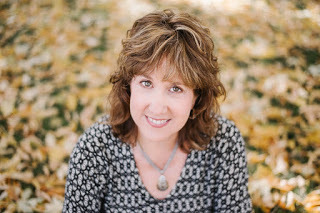 Beth K. Vogt believes God’s best often waits behind the doors marked “Never.”
Beth K. Vogt believes God’s best often waits behind the doors marked “Never.” A nonfiction writer and editor who said she’d never write fiction, Beth is now a novelist with Howard Books. She enjoys writing inspirational contemporary romance because she believes there’s more to happily-ever-after than the fairy tales tell us. Connect with Beth on her website, Twitter, Facebook, or check out her blog on quotes, In Others’ Words.
Published on February 13, 2016 01:00
February 12, 2016
Create Once, Sell Twice
by Vonda Skelton @VondaSkelton
 Years ago I was listening to a National Speakers Association (NSA) training CD when Tom Searcy said something like, "Never create something once that you can't sell twice."
Years ago I was listening to a National Speakers Association (NSA) training CD when Tom Searcy said something like, "Never create something once that you can't sell twice."
Although it would most likely be considered wise counsel in the general market, I must admit that as a Christian writer and speaker, my first response was to cringe.
Sell? And not only once, but twice? Does everything in the world have to go back to money? But the more I thought about it, the more I realized a slightly altered statement applied to Christian speakers as well. After all, don't we create new messages and hope to have the opportunity to share them over and over again? Wasn't that the same as creating it once and "selling" it twice?
For some reason, it was easier to accept for me as a writer. But as a speaker, I was struggling.
 When I first began my speaking ministry, I would create a program, deliver it, and then stuff it away somewhere, never to be seen again. And even as the Lord began multiplying my opportunities to speak, I often would write out a message in long hand in a journal, notebook, or even scratch pieces of paper! I can't count the number of times I wrote out a message, used it, and then couldn't find it again. That's not what I do now.
When I first began my speaking ministry, I would create a program, deliver it, and then stuff it away somewhere, never to be seen again. And even as the Lord began multiplying my opportunities to speak, I often would write out a message in long hand in a journal, notebook, or even scratch pieces of paper! I can't count the number of times I wrote out a message, used it, and then couldn't find it again. That's not what I do now.
And you shouldn't, either.
Now, as I write out a message, I create a Word file with everything I'm given, even if I know it's more than I can use for that specific event. I also include thoughts on various messages, applications, and audiences this material can be tweaked and used for.
For instance, at different times, Celebrating Womanhood: Bubbles to Beaus, Babies to Bedpans has been slightly altered to fit messages about using spiritual gifts, unity in the church, and for a more general women's audience, I am Woman: Hear Me Whine! And my program on Beauty can be changed slightly to fit audiences of adult women, teens, or mothers and daughters. And it's all from the same research. As a matter of fact, many of my messages can be presented in a way that will fit with a variety of audiences.
So, after thinking more about the speaker's statement all those years ago and looking at it from God's point of view, I can say with confidence that His economy for speakers is definitely "Create once and TELL twice!"
After all, that’s what Jesus did.
TWEETABLE
Create Once, Sell Twice - wisdom for #writing & #speaking from @VondaSkelton on @EdieMelson (Click to Tweet)
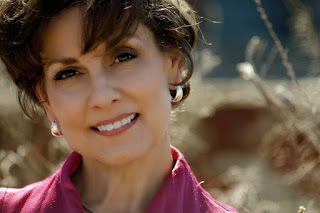 Vonda Skelton is a speaker and the author of four books: Seeing Through the Lies: Unmasking the Myths Women Believe and the 3-book Bitsy Burroughs mysteries for children 8-12 yo. She’s the founder and co-director of Christian Communicators Conference, offering speakers’ training and community for Christian women called to ministry. Vonda is a frequent instructor at writer’s conferences and keynotes at business, women’s, and associational events. You can find out more about Vonda, as well as writing opportunities and instruction at her writer’s blog, The Christian Writer’s Den at VondaSkelton.com.
Vonda Skelton is a speaker and the author of four books: Seeing Through the Lies: Unmasking the Myths Women Believe and the 3-book Bitsy Burroughs mysteries for children 8-12 yo. She’s the founder and co-director of Christian Communicators Conference, offering speakers’ training and community for Christian women called to ministry. Vonda is a frequent instructor at writer’s conferences and keynotes at business, women’s, and associational events. You can find out more about Vonda, as well as writing opportunities and instruction at her writer’s blog, The Christian Writer’s Den at VondaSkelton.com.
 Years ago I was listening to a National Speakers Association (NSA) training CD when Tom Searcy said something like, "Never create something once that you can't sell twice."
Years ago I was listening to a National Speakers Association (NSA) training CD when Tom Searcy said something like, "Never create something once that you can't sell twice." Although it would most likely be considered wise counsel in the general market, I must admit that as a Christian writer and speaker, my first response was to cringe.
Sell? And not only once, but twice? Does everything in the world have to go back to money? But the more I thought about it, the more I realized a slightly altered statement applied to Christian speakers as well. After all, don't we create new messages and hope to have the opportunity to share them over and over again? Wasn't that the same as creating it once and "selling" it twice?
For some reason, it was easier to accept for me as a writer. But as a speaker, I was struggling.
 When I first began my speaking ministry, I would create a program, deliver it, and then stuff it away somewhere, never to be seen again. And even as the Lord began multiplying my opportunities to speak, I often would write out a message in long hand in a journal, notebook, or even scratch pieces of paper! I can't count the number of times I wrote out a message, used it, and then couldn't find it again. That's not what I do now.
When I first began my speaking ministry, I would create a program, deliver it, and then stuff it away somewhere, never to be seen again. And even as the Lord began multiplying my opportunities to speak, I often would write out a message in long hand in a journal, notebook, or even scratch pieces of paper! I can't count the number of times I wrote out a message, used it, and then couldn't find it again. That's not what I do now.And you shouldn't, either.
Now, as I write out a message, I create a Word file with everything I'm given, even if I know it's more than I can use for that specific event. I also include thoughts on various messages, applications, and audiences this material can be tweaked and used for.
For instance, at different times, Celebrating Womanhood: Bubbles to Beaus, Babies to Bedpans has been slightly altered to fit messages about using spiritual gifts, unity in the church, and for a more general women's audience, I am Woman: Hear Me Whine! And my program on Beauty can be changed slightly to fit audiences of adult women, teens, or mothers and daughters. And it's all from the same research. As a matter of fact, many of my messages can be presented in a way that will fit with a variety of audiences.
So, after thinking more about the speaker's statement all those years ago and looking at it from God's point of view, I can say with confidence that His economy for speakers is definitely "Create once and TELL twice!"
After all, that’s what Jesus did.
TWEETABLE
Create Once, Sell Twice - wisdom for #writing & #speaking from @VondaSkelton on @EdieMelson (Click to Tweet)
 Vonda Skelton is a speaker and the author of four books: Seeing Through the Lies: Unmasking the Myths Women Believe and the 3-book Bitsy Burroughs mysteries for children 8-12 yo. She’s the founder and co-director of Christian Communicators Conference, offering speakers’ training and community for Christian women called to ministry. Vonda is a frequent instructor at writer’s conferences and keynotes at business, women’s, and associational events. You can find out more about Vonda, as well as writing opportunities and instruction at her writer’s blog, The Christian Writer’s Den at VondaSkelton.com.
Vonda Skelton is a speaker and the author of four books: Seeing Through the Lies: Unmasking the Myths Women Believe and the 3-book Bitsy Burroughs mysteries for children 8-12 yo. She’s the founder and co-director of Christian Communicators Conference, offering speakers’ training and community for Christian women called to ministry. Vonda is a frequent instructor at writer’s conferences and keynotes at business, women’s, and associational events. You can find out more about Vonda, as well as writing opportunities and instruction at her writer’s blog, The Christian Writer’s Den at VondaSkelton.com.
Published on February 12, 2016 01:00
February 11, 2016
6 Ways to Manage Writing Time & Encourage Creativity
by Lynette Eason @LynetteEason
 At what point do you have to step back and say, “No, I’m sorry, I simply can’t add one more thing to my calendar?”
At what point do you have to step back and say, “No, I’m sorry, I simply can’t add one more thing to my calendar?”
Truth is, I’m still trying to figure that one out. Christmas 2015 came and went in a blur. Then the month of January somehow passed me by. And now February is doing the same!
As a writer, I can very easily spend all of my time in front of the computer. During the school day, I typically have from about 8:00AM – 3:30PM (and sometimes longer if everyone is working or hanging out with friends) to write without interruption. Time that I’m not doing something for my children or husband, etc., can be gone in the blink of an eye by the time I look up from my laptop. And while it’s productive (MOST of the time) writing wise, it’s not always productive “healthy” wise.Time is flying at the speed of light and I’m trying to figure out what to do about it. But how can you slow down time? I’m not exactly sure, but I’ve been thinking about it. I came up with six ways to possibly get more enjoyment out of my day and to stop feeling like I’m a hamster on a wheel!
Here are the six things I thought might help. 1. I want to make sure I spend time with God daily. Yes, I talk to God on a daily basis, but I don’t always listen. I need to make sure that I spend time just listening to him. When you’re going full speed ahead, it’s hard to listen to family members or friends, much less God.2. Set an alarm to remind you to stop and do something you like. Be creative. Do some Bible journaling or scrapbooking. Go outside and take the dog for a walk. (He’ll appreciate it!) Write someone a card thanking them for a kindness or just to them know you’re thinking about them.3. Clean something. When you’re cleaning, it’s a great time to talk to God—or maybe listen.4. Plan something to look forward to. I don’t know about you, but when I’m in anticipation of a trip or some fun, time always slows down!5. Set a timer for social media. If Facebook and other social media sites distract you and you find yourself losing track of time because you’re engrossed in other peoples’ lives, then limit your time on it.
1. I want to make sure I spend time with God daily. Yes, I talk to God on a daily basis, but I don’t always listen. I need to make sure that I spend time just listening to him. When you’re going full speed ahead, it’s hard to listen to family members or friends, much less God.2. Set an alarm to remind you to stop and do something you like. Be creative. Do some Bible journaling or scrapbooking. Go outside and take the dog for a walk. (He’ll appreciate it!) Write someone a card thanking them for a kindness or just to them know you’re thinking about them.3. Clean something. When you’re cleaning, it’s a great time to talk to God—or maybe listen.4. Plan something to look forward to. I don’t know about you, but when I’m in anticipation of a trip or some fun, time always slows down!5. Set a timer for social media. If Facebook and other social media sites distract you and you find yourself losing track of time because you’re engrossed in other peoples’ lives, then limit your time on it.
 6. Say, “No.” Now, it okay not to be rude about it, but it’s also okay to be firm and mean it. When someone wants to add something else to a calendar that’s already overflowing, implement that beautiful word, “No.” I’ve never been very good at it, but I’m learning! I love Lysa Terkeurst’s The Best Yesbook. If you haven’t read it, I highly recommend it. I could so relate to just about every single word in that book. She talks about how we often say “yes” to things we should say “no” to. Not because they are bad things, but because they’re not the “best” things. I really like that because I want to have the time in my schedule to say YES to the things that I really want to do!
6. Say, “No.” Now, it okay not to be rude about it, but it’s also okay to be firm and mean it. When someone wants to add something else to a calendar that’s already overflowing, implement that beautiful word, “No.” I’ve never been very good at it, but I’m learning! I love Lysa Terkeurst’s The Best Yesbook. If you haven’t read it, I highly recommend it. I could so relate to just about every single word in that book. She talks about how we often say “yes” to things we should say “no” to. Not because they are bad things, but because they’re not the “best” things. I really like that because I want to have the time in my schedule to say YES to the things that I really want to do!
Will these six things work? It’s possible. I’m going to make a conscious effort to give them a go and see what happens. Time might still fly, but at least I’ll be a little more aware of the world and people around me while it’s flying by—and maybe I’ll touch someone in a way that they needed because I took the time to write a card or send an email or a thoughtful text. Who knows?
What about you? Does time get away from you? What do you do about it? I’d love to hear more ideas on slowing down time!
TWEETABLE
6 Ways to Manage #Writing Time & Encourage #Creativity - @LynetteEason on @EdieMelson (Click to Tweet)
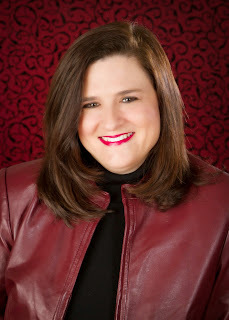 Lynette Eason is the award-winning, bestselling author of over thirty books. Lynette writes for Revell and Harlequin’s Love Inspired Suspense line. Her books have finaled or won awards in contests such as The Maggies, Inspirational Readers Choice Award, The Carol, ECPA Book of the Year, The Selah, and others. Her most recent wins are the Carol Award in 2013 and the Inspirational Readers Choice Award in 2014. She began her teaching career in the public school classroom and has since moved to teaching at conferences all over the country. Lynette often speaks at women’s conference and retreats, but finds her first love is teaching writing. In her spare time she can be found hanging out with her family, loving on her nieces and nephews, traveling, and…um…writing. Lynette and her husband Jack live in South Carolina with their two teenagers. Life is never boring, that’s for sure! Lynette can often be found online at www.facebook.com/lynette.eason @lynetteeason on Twitter, and www.lynetteeason.com.
Lynette Eason is the award-winning, bestselling author of over thirty books. Lynette writes for Revell and Harlequin’s Love Inspired Suspense line. Her books have finaled or won awards in contests such as The Maggies, Inspirational Readers Choice Award, The Carol, ECPA Book of the Year, The Selah, and others. Her most recent wins are the Carol Award in 2013 and the Inspirational Readers Choice Award in 2014. She began her teaching career in the public school classroom and has since moved to teaching at conferences all over the country. Lynette often speaks at women’s conference and retreats, but finds her first love is teaching writing. In her spare time she can be found hanging out with her family, loving on her nieces and nephews, traveling, and…um…writing. Lynette and her husband Jack live in South Carolina with their two teenagers. Life is never boring, that’s for sure! Lynette can often be found online at www.facebook.com/lynette.eason @lynetteeason on Twitter, and www.lynetteeason.com.
 At what point do you have to step back and say, “No, I’m sorry, I simply can’t add one more thing to my calendar?”
At what point do you have to step back and say, “No, I’m sorry, I simply can’t add one more thing to my calendar?” Truth is, I’m still trying to figure that one out. Christmas 2015 came and went in a blur. Then the month of January somehow passed me by. And now February is doing the same!
As a writer, I can very easily spend all of my time in front of the computer. During the school day, I typically have from about 8:00AM – 3:30PM (and sometimes longer if everyone is working or hanging out with friends) to write without interruption. Time that I’m not doing something for my children or husband, etc., can be gone in the blink of an eye by the time I look up from my laptop. And while it’s productive (MOST of the time) writing wise, it’s not always productive “healthy” wise.Time is flying at the speed of light and I’m trying to figure out what to do about it. But how can you slow down time? I’m not exactly sure, but I’ve been thinking about it. I came up with six ways to possibly get more enjoyment out of my day and to stop feeling like I’m a hamster on a wheel!
Here are the six things I thought might help.
 1. I want to make sure I spend time with God daily. Yes, I talk to God on a daily basis, but I don’t always listen. I need to make sure that I spend time just listening to him. When you’re going full speed ahead, it’s hard to listen to family members or friends, much less God.2. Set an alarm to remind you to stop and do something you like. Be creative. Do some Bible journaling or scrapbooking. Go outside and take the dog for a walk. (He’ll appreciate it!) Write someone a card thanking them for a kindness or just to them know you’re thinking about them.3. Clean something. When you’re cleaning, it’s a great time to talk to God—or maybe listen.4. Plan something to look forward to. I don’t know about you, but when I’m in anticipation of a trip or some fun, time always slows down!5. Set a timer for social media. If Facebook and other social media sites distract you and you find yourself losing track of time because you’re engrossed in other peoples’ lives, then limit your time on it.
1. I want to make sure I spend time with God daily. Yes, I talk to God on a daily basis, but I don’t always listen. I need to make sure that I spend time just listening to him. When you’re going full speed ahead, it’s hard to listen to family members or friends, much less God.2. Set an alarm to remind you to stop and do something you like. Be creative. Do some Bible journaling or scrapbooking. Go outside and take the dog for a walk. (He’ll appreciate it!) Write someone a card thanking them for a kindness or just to them know you’re thinking about them.3. Clean something. When you’re cleaning, it’s a great time to talk to God—or maybe listen.4. Plan something to look forward to. I don’t know about you, but when I’m in anticipation of a trip or some fun, time always slows down!5. Set a timer for social media. If Facebook and other social media sites distract you and you find yourself losing track of time because you’re engrossed in other peoples’ lives, then limit your time on it.
 6. Say, “No.” Now, it okay not to be rude about it, but it’s also okay to be firm and mean it. When someone wants to add something else to a calendar that’s already overflowing, implement that beautiful word, “No.” I’ve never been very good at it, but I’m learning! I love Lysa Terkeurst’s The Best Yesbook. If you haven’t read it, I highly recommend it. I could so relate to just about every single word in that book. She talks about how we often say “yes” to things we should say “no” to. Not because they are bad things, but because they’re not the “best” things. I really like that because I want to have the time in my schedule to say YES to the things that I really want to do!
6. Say, “No.” Now, it okay not to be rude about it, but it’s also okay to be firm and mean it. When someone wants to add something else to a calendar that’s already overflowing, implement that beautiful word, “No.” I’ve never been very good at it, but I’m learning! I love Lysa Terkeurst’s The Best Yesbook. If you haven’t read it, I highly recommend it. I could so relate to just about every single word in that book. She talks about how we often say “yes” to things we should say “no” to. Not because they are bad things, but because they’re not the “best” things. I really like that because I want to have the time in my schedule to say YES to the things that I really want to do!Will these six things work? It’s possible. I’m going to make a conscious effort to give them a go and see what happens. Time might still fly, but at least I’ll be a little more aware of the world and people around me while it’s flying by—and maybe I’ll touch someone in a way that they needed because I took the time to write a card or send an email or a thoughtful text. Who knows?
What about you? Does time get away from you? What do you do about it? I’d love to hear more ideas on slowing down time!
TWEETABLE
6 Ways to Manage #Writing Time & Encourage #Creativity - @LynetteEason on @EdieMelson (Click to Tweet)
 Lynette Eason is the award-winning, bestselling author of over thirty books. Lynette writes for Revell and Harlequin’s Love Inspired Suspense line. Her books have finaled or won awards in contests such as The Maggies, Inspirational Readers Choice Award, The Carol, ECPA Book of the Year, The Selah, and others. Her most recent wins are the Carol Award in 2013 and the Inspirational Readers Choice Award in 2014. She began her teaching career in the public school classroom and has since moved to teaching at conferences all over the country. Lynette often speaks at women’s conference and retreats, but finds her first love is teaching writing. In her spare time she can be found hanging out with her family, loving on her nieces and nephews, traveling, and…um…writing. Lynette and her husband Jack live in South Carolina with their two teenagers. Life is never boring, that’s for sure! Lynette can often be found online at www.facebook.com/lynette.eason @lynetteeason on Twitter, and www.lynetteeason.com.
Lynette Eason is the award-winning, bestselling author of over thirty books. Lynette writes for Revell and Harlequin’s Love Inspired Suspense line. Her books have finaled or won awards in contests such as The Maggies, Inspirational Readers Choice Award, The Carol, ECPA Book of the Year, The Selah, and others. Her most recent wins are the Carol Award in 2013 and the Inspirational Readers Choice Award in 2014. She began her teaching career in the public school classroom and has since moved to teaching at conferences all over the country. Lynette often speaks at women’s conference and retreats, but finds her first love is teaching writing. In her spare time she can be found hanging out with her family, loving on her nieces and nephews, traveling, and…um…writing. Lynette and her husband Jack live in South Carolina with their two teenagers. Life is never boring, that’s for sure! Lynette can often be found online at www.facebook.com/lynette.eason @lynetteeason on Twitter, and www.lynetteeason.com.
Published on February 11, 2016 01:00



